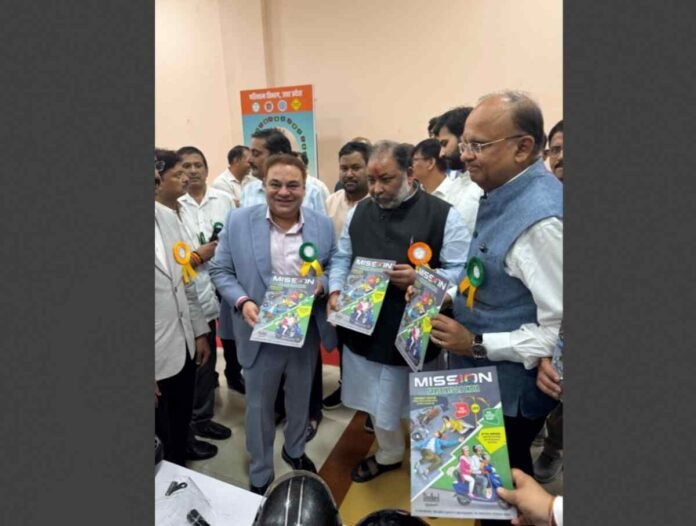- The 50% reduction target in road accidents set by Hon’ble Chief Minister Yogi Adityanath is not just administrative—it is a moral and humanitarian goal: Transport Commissioner Brijesh Narayan Singh
- To ensure safety, fake helmets must be penalized, and we must leverage technology and AI: Rajeev Kapur
New Delhi, June 30, 2025: The 25th National Workshop on Road Safety & Best Practices, Organized jointly by the All India Federation of Motor Vehicle Department Technical Executive Officers Association and the Transport Regional Inspectors Service Association, the two-day conference aims to curb road accidents and raise awareness about road safety.
During the inaugural address Hon’ble Transport Minister Shri Dayashankar Singh said: “Despite limited resources, Uttar Pradesh is making great strides in the direction of road safety. We are continuously introducing new initiatives, focusing on vehicle fitness and child awareness.
“Hon’ble Prime Minister’s vision for a developed India by 2047 underscores the importance of road safety as a crucial component of this mission. Shri Brijesh Narayan Singh, Transport Commissioner emphasize that road safety transcends mere statistics – it is about safeguarding the lives of every individual and living being. The Chief Minister’s ambitious target to reduce accident fatalities by 50% is not just an administrative goal, but a moral and humanitarian imperative. The Uttar Pradesh Government’s ‘Vision 2030 Roadmap’ outlines a comprehensive framework built on the pillars of education, engineering, enforcement, and emergency response, which is being implemented with missionary zeal to achieve this objective.”
Mr. Rajeev Kapur, MD, Steelbird Helmets & President, 2 WHEELER Helmet Manufacturer Association India, said, at Steelbird Helmets, we’re committed to road safety through our ‘Mission Save Lives’ campaign, in partnership with UN and WHO. Our mission is straightforward: to prevent helmet-related fatalities. We manufacture BIS-standard helmets and aim to reduce road fatalities by 50% by 2031.
“Strict enforcement is crucial to curb reckless behavior such as red-light jumping, drink-driving, and over speeding. Notably, India faces a significant helmet shortage, with 50% of helmets in the market being counterfeit. To bridge the gap between demand and supply, we need a fourfold increase in helmet production, requiring an investment of ₹6,000 crore, 2 crore sq. ft. of space, and 80,000 workers. This will ensure affordable and authentic helmets for all”, Mr. kapur added.
Through ‘Mission Save Lives 2.0’, we’re launching a national movement to promote BIS-certified helmets, penalize fake ones, and integrate technology for enhanced protection. Our goal is to make certified helmets accessible, affordable, and mandatory for all riders, passengers and childrens.
India recorded approximately 1.72 lakh road fatalities and 4.63 lakh injuries in 2023, with VRUs—primarily two-wheeler riders and pedestrians—bearing the brunt. Two-wheeler users alone accounted for nearly 44.8% of all deaths (around 77,000), with an estimated 54,000 fatalities linked directly to the non-use of helmets. Pedestrians contributed to nearly 20% of fatalities (approximately 35,000 deaths). Together, these two groups represented around 65% of total road fatalities, highlighting the urgent need for targeted interventions.
The initiative proposes a phased, nationwide implementation beginning in Tier 1 cities in 2028, expanding to Tier 2 cities by 2029, and reaching Tier 3 cities and rural areas by January 2031. The mission aims to systematically tackle helmet non-compliance by region while ensuring manufacturers can scale production to meet the rising demand, said Mr. Rajeev Kapur.
Mission Save Lives 2.0 India also calls for stringent licensing reforms—real-time verification and periodic audits of BIS license holders, targeted raids, and strict legal enforcement to dismantle the fake helmet ecosystem. Additionally, every helmet manufacturer must maintain a fully equipped, in-house BIS-approved testing laboratory to ensure consistent compliance with national safety standards.
Currently, helmets attract an 18% GST, categorizing them as non-essential items. The mission advocates for reducing GST to 12% and reclassifying helmets as essential, life-saving equipment, making them more affordable, especially for price-sensitive buyers.
The plan further mandates that all two-wheeler manufacturers supply one BIS certified helmet immediately and two BIS-certified helmets—one for the rider and one for the pillion—effective January 2027, ensuring that buyers receive certified safety gear at the point of sale.
“We owe it to every two-wheeler rider and their families to create safer roads,” Mr. Kapur concluded. “A real helmet takes just seconds to wear but can save a lifetime.”
The conference was attended by Regional Inspectors (RIs) and Motor Vehicle Inspectors (MVIs) from states including Uttar Pradesh, Maharashtra, Madhya Pradesh, Bihar, and West Bengal.



